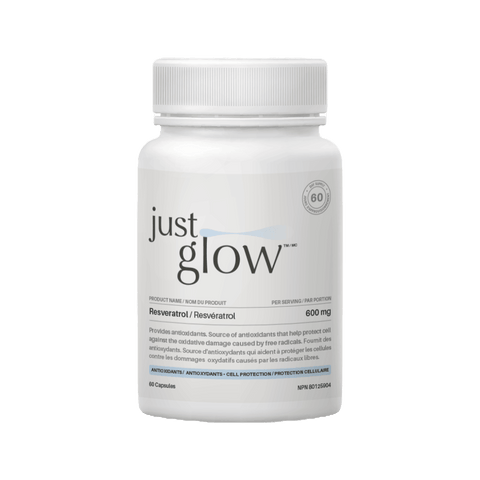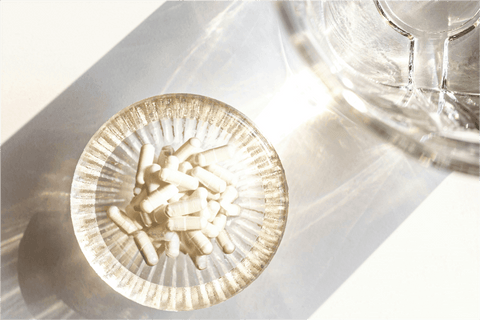Here's Your NMN Supplementation Guide

What is NMN?
NMN (nicotinamide mononucleotide) is a molecule present in all living cells, known for its metabolic and anti-aging properties. Within cells, NMN is converted into NAD+ (nicotinamide adenine dinucleotide), a crucial coenzyme involved in various cellular processes.
As we age, NAD+ levels naturally decline, reaching about half of the levels found in younger individuals by the age of 50. This decline in NAD+ can impair cellular function and contribute to age-related health issues.
Maintaining adequate levels of NMN in the body can help support NAD+ production and promote healthy aging. Some potential benefits of sufficient NMN levels include:
- Suppression of Age-Associated Weight Gain: NMN may help regulate metabolism and energy expenditure, potentially reducing age-related weight gain.
-
Improved Insulin Sensitivity: NMN has been suggested to enhance insulin sensitivity, which is important for regulating blood sugar levels and preventing insulin resistance, a common issue associated with aging and metabolic disorders.
- DNA Protection: NMN may help protect DNA from age-related damage and mutations, thus preserving genetic integrity and reducing the risk of age-related diseases.
Can NMN be Obtained from Food?
NMN (nicotinamide mononucleotide) does exist in trace amounts in certain foods such as broccoli, edamame, cucumber, and avocados. Including these foods in your diet is beneficial as they provide a variety of essential nutrients and antioxidants.
However, it is important to note that while NMN is present in these foods, obtaining a sufficient dose solely from dietary sources can be challenging. The levels of NMN found in food are relatively low, and it would be difficult to consume enough of these foods to significantly impact NMN levels in the body.
Is Taking a NAD+ Supplement Possible?
While some may consider taking a NAD+ supplement, it's worth noting that the NAD+ molecule is too large to penetrate cells efficiently, rendering it less effective as a supplement. NMN, on the other hand, serves as a direct precursor to NAD+ and has been demonstrated to significantly elevate NAD+ and NAD+ metabolite concentrations, making it a more promising option for supplementation.
Should NMN be Taken Alone or with Other Ingredients?
When considering NMN supplementation, the choice between taking it on its own or in combination with other ingredients depends on individual preferences and health goals. While standalone NMN supplements can provide benefits, some formulations on the market combine NMN with other active ingredients for potentially enhanced effects.
Combining NMN with complementary ingredients, such as spermidine, may offer synergistic benefits. These synergies can result in enhanced efficacy compared to taking each ingredient separately. For example, spermidine is known for its role in cellular processes like autophagy and has been suggested to complement NMN's anti-aging and metabolic effects.
How Do I Decide the Right Dose?
NMN supplements are commonly available in dosages of 100 mg, 250 mg, or 500 mg. Choosing the appropriate dosage can be challenging, especially when considering NMN's declining levels as we age. In our 20s, NMN levels are typically at their highest, but they diminish over time, increasing our requirement for supplementation. Therefore, as we age, opting for higher doses of NMN may be beneficial to meet our changing needs.
What are the Benefits of a Higher NMN Dose?
For individuals aged 25 to 35, a lower NMN dosage may suffice. However, those over 35 might benefit more from a 250 mg dosage to address increased NMN demands. As individuals near middle age and experience significant declines in NMN levels compared to their 20s, transitioning to a higher dosage may be advisable to mitigate age-related declines.
It's essential to adhere to the dosage instructions provided on the product label and seek guidance from a reliable healthcare provider to adjust your dosage as needed based on changing requirements. The availability of a range in dosing provides flexibility to accommodate individual needs over time.
FAQs
What is NMN?
NMN (Nicotinamide Mononucleotide) is a precursor to NAD+, essential for cellular energy production and is widely studied for its anti-aging benefits.
What are the benefits of NMN?
NMN may help boost energy metabolism, support cell repair, and contribute to anti-aging, improved cognitive function, and increased stamina.
What is the recommended dosage of NMN supplements?
The typical recommended dosage is 250mg to 500mg per day, though it can vary based on individual needs.
When should I take NMN?
It’s usually recommended to take NMN in the morning, after breakfast, to support energy levels throughout the day.
What are the side effects of NMN?
NMN is generally safe for most people, though some may experience mild side effects like digestive discomfort or headaches.
Where can I buy NMN in Canada?
NMN can be purchased online from health supplement stores or through retailers that specialize in imported health products.
Can I get NMN from food or vegetables?
NMN is found in small amounts in foods like broccoli, avocados, and tomatoes, but supplements provide a more concentrated source.
Is NMN still for sale in the USA after being banned by the FDA?
Yes, NMN is still available for sale in the USA. Although major retailers like Amazon and Walmart have removed it, you can still find NMN online from various U.S. and international websites.
Summary
NMN. You've probably encountered discussions about NMN in health forums, anti-aging blogs, and scientific research. But what exactly is NMN, what does it do, and Can I get NMN from food?Let's delve into a comprehensive understanding of NMN and its role in maintaining health and vitality.






